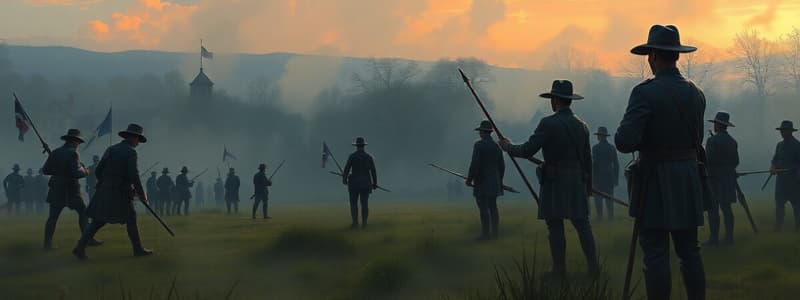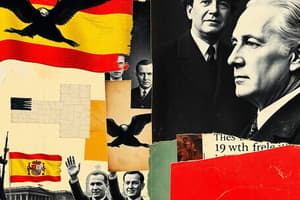Podcast
Questions and Answers
What was a significant consequence of the Battle of Fredericksburg?
What was a significant consequence of the Battle of Fredericksburg?
- Great Confederate victory resulting in significant Union losses (correct)
- Union victory leading to a siege on Richmond
- Capture of a major Union city by Confederates
- Strategic retreat of Confederate forces
What characterized the outcome of the Battle of Chancellorsville?
What characterized the outcome of the Battle of Chancellorsville?
- Confederates achieved a significant victory despite Jackson's injury (correct)
- A stalemate leading to no territorial changes
- Union forces were able to hold their positions
- Union forces captured Lee's army
What was the main objective during Lee's invasion at the Battle of Gettysburg?
What was the main objective during Lee's invasion at the Battle of Gettysburg?
- To defeat the Army of the Potomac on Northern soil (correct)
- To secure control of the Mississippi River
- To capture a vital Union supply line
- To defend Virginia from Union troops
What was a notable feature of Pickett's Charge during the Battle of Gettysburg?
What was a notable feature of Pickett's Charge during the Battle of Gettysburg?
What was the outcome of the Fall of Vicksburg?
What was the outcome of the Fall of Vicksburg?
What pivotal role did Ulysses S. Grant assume in March 1864?
What pivotal role did Ulysses S. Grant assume in March 1864?
What strategy did Grant employ during the Overland Campaign?
What strategy did Grant employ during the Overland Campaign?
Which of the following best describes the Battle of the Wilderness?
Which of the following best describes the Battle of the Wilderness?
What was the result of the Battle of Spotsylvania Courthouse?
What was the result of the Battle of Spotsylvania Courthouse?
Which event is considered Lee's last victory?
Which event is considered Lee's last victory?
What major strategic advantage did the Siege of Petersburg provide?
What major strategic advantage did the Siege of Petersburg provide?
What significant tactic did Sherman employ during his march through Georgia?
What significant tactic did Sherman employ during his march through Georgia?
What was a major consequence of Sherman's March through the South?
What was a major consequence of Sherman's March through the South?
Which battle is associated with 100 million dollars in damage to the South?
Which battle is associated with 100 million dollars in damage to the South?
What role did Sherman's victory at Atlanta play in the 1864 election?
What role did Sherman's victory at Atlanta play in the 1864 election?
Which statement reflects Lincoln's approach in his second inaugural address?
Which statement reflects Lincoln's approach in his second inaugural address?
During which battle did the Union sustain the highest losses in a short time frame?
During which battle did the Union sustain the highest losses in a short time frame?
What was a significant outcome of the Overland Campaign?
What was a significant outcome of the Overland Campaign?
Which event during Sherman’s March was aimed at breaking Southern morale?
Which event during Sherman’s March was aimed at breaking Southern morale?
What was the strategic significance of the Siege of Petersburg?
What was the strategic significance of the Siege of Petersburg?
What was the name of the plan that involved burning much of Atlanta?
What was the name of the plan that involved burning much of Atlanta?
What did Lincoln’s opponents advocate for in the Election of 1864?
What did Lincoln’s opponents advocate for in the Election of 1864?
What was a notable feature of Sherman's tactics during his march?
What was a notable feature of Sherman's tactics during his march?
What was a characteristic of the Battle of Cold Harbor?
What was a characteristic of the Battle of Cold Harbor?
What was the main reason Lincoln replaced George McClellan after the Battle of Antietam?
What was the main reason Lincoln replaced George McClellan after the Battle of Antietam?
Which Battle resulted in the most total casualties during the specified phase of the Civil War?
Which Battle resulted in the most total casualties during the specified phase of the Civil War?
During what military action did General Jackson suffer wounds from friendly fire?
During what military action did General Jackson suffer wounds from friendly fire?
What was the strategic significance of the Fall of Vicksburg?
What was the strategic significance of the Fall of Vicksburg?
Which general was appointed as Lieutenant General by Lincoln in March 1864?
Which general was appointed as Lieutenant General by Lincoln in March 1864?
What characterized Grant's strategy during the 1864 Overland Campaign?
What characterized Grant's strategy during the 1864 Overland Campaign?
What was the outcome of the Battle of Fredericksburg in December 1862?
What was the outcome of the Battle of Fredericksburg in December 1862?
Which event did NOT happen as a result of Lee's invasion at Gettysburg?
Which event did NOT happen as a result of Lee's invasion at Gettysburg?
Flashcards
Battle of Fredericksburg
Battle of Fredericksburg
A major Civil War battle in December 1862, resulting in a significant Confederate victory and heavy Union losses.
Battle of Chancellorsville
Battle of Chancellorsville
A major Civil War battle in May 1863, ending in a Confederate victory and the death of Stonewall Jackson.
Battle of Gettysburg
Battle of Gettysburg
A major Civil War battle in July 1863, resulting in a decisive Union victory and turning point of the war.
Fall of Vicksburg
Fall of Vicksburg
Signup and view all the flashcards
Grant as Lieutenant General
Grant as Lieutenant General
Signup and view all the flashcards
Overland Campaign
Overland Campaign
Signup and view all the flashcards
Battle of the Wilderness
Battle of the Wilderness
Signup and view all the flashcards
Pickett's Charge
Pickett's Charge
Signup and view all the flashcards
Spotsylvania Courthouse Battle Outcome
Spotsylvania Courthouse Battle Outcome
Signup and view all the flashcards
Cold Harbor Battle Outcome
Cold Harbor Battle Outcome
Signup and view all the flashcards
Overland Campaign Impact (Union)
Overland Campaign Impact (Union)
Signup and view all the flashcards
Siege of Petersburg Importance
Siege of Petersburg Importance
Signup and view all the flashcards
Sherman's March Through Georgia Goal
Sherman's March Through Georgia Goal
Signup and view all the flashcards
Atlanta's Fate
Atlanta's Fate
Signup and view all the flashcards
Sherman's March Through the South
Sherman's March Through the South
Signup and view all the flashcards
Appomattox Surrender
Appomattox Surrender
Signup and view all the flashcards
Burnside's Failure
Burnside's Failure
Signup and view all the flashcards
Chancellorsville Victory
Chancellorsville Victory
Signup and view all the flashcards
Gettysburg's Turning Point
Gettysburg's Turning Point
Signup and view all the flashcards
Vicksburg's Significance
Vicksburg's Significance
Signup and view all the flashcards
Grant's Leadership
Grant's Leadership
Signup and view all the flashcards
War of Attrition
War of Attrition
Signup and view all the flashcards
Overland Campaign Impact
Overland Campaign Impact
Signup and view all the flashcards
Grant's Key Objective
Grant's Key Objective
Signup and view all the flashcards
Overland Campaign's Outcome
Overland Campaign's Outcome
Signup and view all the flashcards
Petersburg's Importance
Petersburg's Importance
Signup and view all the flashcards
Sherman's Strategy
Sherman's Strategy
Signup and view all the flashcards
Sherman's March Significance
Sherman's March Significance
Signup and view all the flashcards
Lincoln's Second Inaugural
Lincoln's Second Inaugural
Signup and view all the flashcards
Appomattox's Outcome
Appomattox's Outcome
Signup and view all the flashcards
Study Notes
Battle of Fredericksburg
- Union forces suffered a devastating defeat, marking a major setback for the Union cause.
Battle of Chancellorsville
- A Confederate victory, characterized by a bold maneuver by Stonewall Jackson.
Lee's Invasion at Gettysburg
- Lee's main objective was to capture Pennsylvania and force the Union to negotiate peace, potentially ending the war.
Pickett's Charge
- A failed Confederate assault, characterized by a massive wave of infantry.
Fall of Vicksburg
- A major Union victory, giving them control of the Mississippi River and dividing the Confederacy.
Ulysses S. Grant's Role
- Grant became the overall commander of the Union army, leading to a more unified and aggressive approach.
Grant's Overland Campaign Strategy
- "Wilderness Campaign," aimed at wearing down Lee’s army through relentless attacks.
Battle of the Wilderness
- Characterized by fierce fighting and high casualties, with limited gains for either side.
Battle of Spotsylvania Courthouse
- A bloody battle with high casualties, resulting in a Union victory.
Lee's Last Victory
- The Battle of Cold Harbor
Siege of Petersburg
- It gave the Union army a strategic advantage by cutting off the Confederate capital, Richmond.
Sherman's March through Georgia
- A devastating tactic, known as "total war" , involved burning and destroying Confederate infrastructure and resources.
Consequence of Sherman's March
- The march played a significant role in undermining Confederate morale and resources.
Battle Associated with $100 Million in Damage
- Sherman's March through Georgia
Sherman's Victory in Atlanta
- It significantly helped Lincoln's re-election efforts in 1864.
Lincoln's Second Inaugural Address
- Focused on achieving a lasting peace and reunification.
Battle with Highest Union Losses
- The Battle of Gettysburg
Outcome of the Overland Campaign
- While costly in terms of casualties, the campaign gradually wore down the Confederate forces.
Sherman's March Targeting Morale
- The destruction of Atlanta aimed at breaking Southern morale.
Strategic Significance of Petersburg
- The Siege cut off the Confederate capital of Richmond and significantly weakened the Confederacy.
Plan to Burn Atlanta
- "Total War," a tactic aimed at crippling Confederate resources.
Lincoln's Opponents in 1864
- Called for a negotiated peace with the Confederacy.
Sherman's Tactics During His March
- Utilized "total war" by destroying civilian infrastructure and disrupting the Southern economy.
Characteristics of Cold Harbor
- A brutal and bloody battle with heavy casualties for both sides.
Lincoln's Reason for Replacing McClellan
- McClellan's reluctance to aggressively pursue the Confederacy frustrated Lincoln, who sought a commander willing to go on the offensive.
Battle with the Most Casualties
- The Battle of Gettysburg
General Jackson's Friendly Fire Incident
- The Battle of Chancellorsville
###Strategic Significance of Vicksburg
- The fall of Vicksburg gave the Union control of the Mississippi River and divided the Confederacy in two.
General Appointed as Lieutenant General
- Ulysses S. Grant
Grant's Strategy in 1864
- Relentlessly pursue the Confederate Army, targeting their resources and morale.
Outcome of Fredericksburg
- A decisive Confederate victory with heavy Union losses.
Event that did NOT happen as a result of Lee's invasion at Gettysburg.
- Lee didn't succeed in capturing Pennsylvania, and the Union was not forced to negotiate peace.
Studying That Suits You
Use AI to generate personalized quizzes and flashcards to suit your learning preferences.




